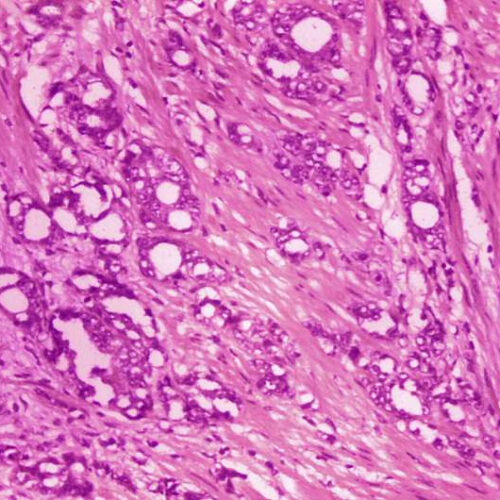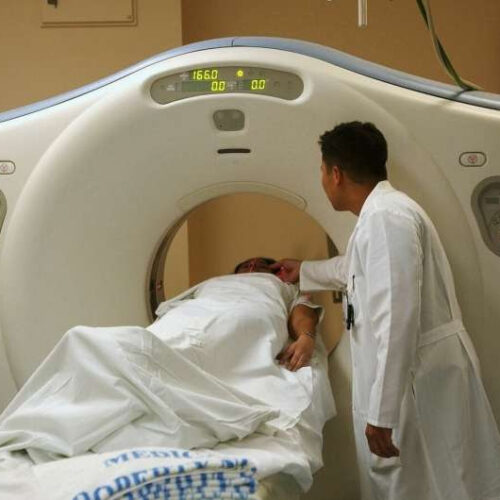by Miriam Jones Bradley, RN No man wants to hear that he has prostate cancer, but if he is diagnosed he will need to learn about the disease and how it is treated. Prostate cancer affects one in seven men. According to the American Cancer Society (ACS), it is the second most common type of cancer among...
Tag: <span>Prostate cancer</span>
Strong link between bone biomarkers and prostate cancer survival
by Stephanie Winn, UC Davis Credit: UC Davis Prostate cancer is the second leading cause of death in American men. Understanding the factors that influence patient outcomes is critical for improving treatment and survival rates. Research led by UC Davis Comprehensive Cancer Center reveals a link between bone metabolism biomarkers and survival in men with newly...
Transgender women are still at risk for prostate cancer
by University of California, San Francisco Credit: Pixabay/CC0 Public Domain Transgender women keep their prostates even after gender-affirming surgery, but the extent to which they remain at risk of prostate cancer has been unclear. Now a first of its kind study led by UC San Francisco has estimated the risk at about 14 cases per 10,000...
Researchers develop CAR T cells that fight prostate cancer in bone
by H. Lee Moffitt Cancer Center & Research Institute BTN expression and spontaneous gamma/delta T cell infiltration in prostate tumors. (A) Bioinformatic analysis of TCR gamma variable regions (TRGV), BTN3A1, BTN2A1, ULBP1, MICA, MICB, and PSCA in bone and soft tissue biopsies from 118 individuals with mCRPC (SU2C/PCF dataset). (B) Specific comparison of TRGV expression in bone metastases....
Study: Vitamin D may play a role in prostate cancer disparities
by Cedars-Sinai Medical Center Credit: CC0 Public Domain Vitamin D deficiency could be the reason African American men experience more aggressive prostate cancer at a younger age compared with European American men, new research from Cedars-Sinai Cancer suggests. The multi-institutional study, published today in Cancer Research Communications, could pave the way for revised nutritional guidelines. While...
Guideline updated for initial management of advanced prostate cancer
by Elana Gotkine For patients with noncastrate advanced prostate cancer, docetaxel, abiraterone, enzalutamide, apalutamide, or darolutamide are each recommended as standards of care with androgen deprivation therapy (ADT), and doublet therapy is inferior to triplet therapy, according to a guideline update published online April 3 in the Journal of Clinical Oncology. Katherine S. Virgo, Ph.D., from the Rollins...
Prostate cancer treatment can wait for most men, study finds
by Carla K. Johnson This 1974 microscope image made available by the Centers for Disease Control and Prevention shows changes in cells indicative of adenocarcinoma of the prostate. A study published by the New England Journal of Medicine on Saturday, March 11, 2023, finds long-term evidence that actively monitoring prostate cancer can be a safe...
Advanced imaging may help in clinical treatment of prostate cancer
by European Association of Urology Credit: Pixabay/CC0 Public Domain An advanced imaging method is showing promise as a way to improve the diagnosis of prostate cancer by giving clinicians a clearer view of suspected tumors during biopsy. A trial conducted at the University Hospital Bonn, in Germany, has been testing the benefit of a scanning...
Newly identified personalized immunotherapy combination treats an aggressive form of advanced prostate cancer
by University of Chicago Medical Center Credit: Unsplash/CC0 Public Domain Immunotherapies have been successful in treating many cancer conditions; however, not much success has yet been achieved in metastatic castrate-resistant prostate cancer (mCRPC). A study published March 2 in Clinical Cancer Research has revealed new insights into why immunotherapies don’t tend to work as well in prostate cancer....
Largest-ever genetic study of prostate cancer in men of African descent finds new risk factors for the disease
KECK SCHOOL OF MEDICINE OF USC Prostate cancer takes a greater toll on Black men than on men of other races. In the United States, one in six Black men will get prostate cancer in their lifetime, compared to one in eight men overall. Black men are also more than twice as likely to die...








